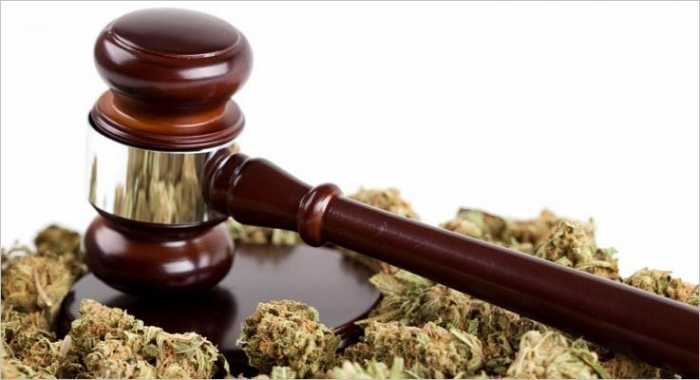You are here
Home 🌿 Marijuana Politics 🌿 Anti-Pot States Can't Touch Colorado's Marijuana Law, Court Says 🌿Anti-Pot States Can't Touch Colorado's Marijuana Law, Court Says

A federal appellate panel on Wednesday blocked the states of Nebraska and Oklahoma from challenging Colorado’s marijuana legalization law, saying their claims should be directed to the U.S. Supreme Court—a venue that has already refused to hear their fight.
Nebraska and Oklahoma sought to intervene in Safe Streets Alliance v. Hickenlooper, a case brought by Colorado residents, law enforcement officials and an anti-drug group, after the U.S. Supreme Court in March 2016 declined to take “original jurisdiction” over their suit. In the high court, the states had alleged Colorado's Amendment 64—which legalized recreational marijuana—violated federal drug laws and brought an increase in crime inside their borders.
The U.S. Court of Appeals for the Tenth Circuit said the dispute Nebraska and Oklahoma brought is with Colorado—not with Gov. John Hickenlooper’s enforcement of Amendment 64, as they alleged. Because the Supreme Court has jurisdiction over disputes between states, the appeals court said, it could not hear the claims.
The two states could return to the high court with their grievances, court scholars and others said, and the Tenth Circuit panel made a point of noting that option.
“The states pointed to no statute, rule, or precedent preventing them from refiling their original complaint in the Supreme Court," Circuit Judge Mary Beck Briscoe wrote for the panel. She added: "We also have found none."
Still, it’s far from certain whether the U.S. Supreme Court will be amenable to hearing a renewed complaint. Only two justices—Clarence Thomas and Samuel Alito Jr.—last year wanted to take up the case that Nebraska and Oklahoma brought against Colorado. Justice Neil Gorsuch, who earlier sat on the Tenth Circuit, ruled for the IRS in a marijuana-related dispute in 2015.
A spokesman for Oklahoma Attorney General Mike Hunter said the states are disappointed with Wednesday’s ruling. “We are reviewing the court’s decision and will evaluate our options to determine the best course of action,” Hunter press aide Alex Gerszewski said.
The Colorado Attorney General’s office didn’t immediately return a message seeking comment.
Property owners got some vindication in the Tenth Circuit decision. The panel reinstated the claims of Colorado landowners who sued a neighboring marijuana grower for damages under the federal Racketeer Influenced and Corrupt Organizations Act, or RICO.
The landowners said the value of their rural Pueblo County property was threatened after Alternative Holistic Healing launched a commercial marijuana farm on adjacent land, sending a “noxious” smell wafting in their direction. The district court dismissed the claims, finding that the landowners failed to prove a financial loss tied to the marijuana operation.
But the appellate panel said the couple, Phillis and Michael Reilly, had demonstrated a number of “plausible” claims, including the loss of their land’s value by “neighboring criminal activity.”
“Marijuana is a controlled substance under the CSA,” Briscoe wrote. “So the manufacture, distribution, and sale of that substance is, by definition, racketeering activity under RICO.”
The panel cautioned that its findings relating to the Reillys’ claims are “narrow” and based on the facts. “We are not suggesting that every private citizen purportedly aggrieved by another person, a group, or an enterprise that is manufacturing, distributing, selling, or using marijuana may pursue a claim under RICO,” Briscoe wrote. “ Nor are we implying that every person tangentially injured in his business or property by such activities has a viable RICO claim.”
Brian Barnes of Cooper & Kirk in Washington, who represented the Reillys and the anti-drug organization Safe Streets Alliance, called the Tenth Circuit’s ruling “a really powerful weapon” for any property owners next to state-legal marijuana operations.
420 Intel is Your Source for Marijuana News
420 Intel Canada is your leading news source for the Canadian cannabis industry. Get the latest updates on Canadian cannabis stocks and developments on how Canada continues to be a major player in the worldwide recreational and medical cannabis industry.
420 Intel Canada is the Canadian Industry news outlet that will keep you updated on how these Canadian developments in recreational and medical marijuana will impact the country and the world. Our commitment is to bring you the most important cannabis news stories from across Canada every day of the week.
Marijuana industry news is a constant endeavor with new developments each day. For marijuana news across the True North, 420 Intel Canada promises to bring you quality, Canadian, cannabis industry news.
You can get 420 Intel news delivered directly to your inbox by signing up for our daily marijuana news, ensuring you’re always kept up to date on the ever-changing cannabis industry. To stay even better informed about marijuana legalization news follow us on Twitter, Facebook and LinkedIn.




